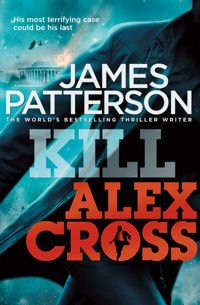 Written by James Patterson – James Patterson has proved a polarising presence in crime fiction, and in publishing more generally. Patterson is nothing if not prolific, and churns out novels at a prodigious pace. Last year saw the release of 11 books authored or co-authored by Patterson, and he released 10 during 2010. This frenetic pace is lucrative for the author, and has resulted in a Guinness World Record for having more bestsellers on the New York Times bestseller list than any other writer. As reported here on CFL he was also the most borrowed fiction author from UK libraries last year. But James Patterson’s blistering pace has earned him more than just plaudits, with Stephen King calling him a ‘terrible writer’ in a USA Today interview.
Written by James Patterson – James Patterson has proved a polarising presence in crime fiction, and in publishing more generally. Patterson is nothing if not prolific, and churns out novels at a prodigious pace. Last year saw the release of 11 books authored or co-authored by Patterson, and he released 10 during 2010. This frenetic pace is lucrative for the author, and has resulted in a Guinness World Record for having more bestsellers on the New York Times bestseller list than any other writer. As reported here on CFL he was also the most borrowed fiction author from UK libraries last year. But James Patterson’s blistering pace has earned him more than just plaudits, with Stephen King calling him a ‘terrible writer’ in a USA Today interview.
Patterson is probably best known for his Alex Cross and Women’s Murder Club thrillers, but he has also written or co-written young adult fiction, romance and science fiction. It does not require much intuition to guess the subject of his recent thriller Kill Alex Cross. Psychologist-turned-detective-turned-FBI agent Alex Cross is a detective with DC’s Metropolitan Police Department once more. Cross is right at the center of the maelstrom when the president’s two kids are abducted and a rash of terror attacks strike Washington, DC. An Islamic group is happy to take credit for the terrorism, but it isn’t so clear who kidnapped the president’s children.
The first lady has heard of Cross’s previous exploits solving kidnappings and his prowess with psychological profiling. So she personally requests that Cross head the search for her children. While Alex Cross is fighting terrorism and solving kidnappings, his grandmother is caring for a purse-snatching foster child who Cross would rather unload on a social service agency.
Cross bounces between the two investigations, with turf battles nodded at but quickly resolved. Likewise, Patterson alludes to Cross’s profiling acumen, but fails to have his hero use it very much. Instead, we are treated to a plodding narrative that fails either to capture the urgency of unprecedented dual national emergencies or to portray the grueling effort that a two-week investigation on both fronts would require.
Patterson has an inventive premise, but it is largely wasted in Kill Alex Cross. He doesn’t provide much in the way of clues to make the search for terrorists or the president’s children mentally compelling. There’s no puzzle for the reader to solve. We simply read along and wait for the next development. Alex Cross seemingly pulls his leads out of thin air, making assumptions and finding them correct each time.
The characters are fairly one-dimensional, and develop little throughout the course of the novel. Alex Cross seems a likable fellow, and you might want to live next door to him, but he isn’t a convincing detective or action hero. There is a confidential informant who might have made an interesting character; instead, the character appears, disappears and is never heard from again. Even the title is misleading. A villain in the novel expresses a desire to kill Alex Cross, but we never hear what plans the bad guy has made to that effect.
Kill Alex Cross is a stream of events that are woefully under-developed, and thus mostly neither thrilling nor suspenseful. Alex Cross’s family drama repeatedly jerks the reader out of the tentative mystery that never quite gets going in the rest of the novel. Longtime readers who want a family newsletter from the Crosses at Christmas might be interested in these developments. Those looking for crime fiction should read elsewhere.
Arrow
Print/Kindle/iBook
£3.59
CFL Rating: 2 Stars









I listened to the 5 CD version of this novel while driving, this being the first (and the last) Patterson book I have (or will) punish myself with. Coming to this with no preconceptions about Patterson I was appalled at the quality of writing and plot development. Your analysis of the herky jerky jumps from the terrorists to the kidnapper to Alex’s cardboard and pedestrian family life are spot-on. Criticizing the laughable incongruities of this novel, such as the kidnapper of the President’s children, an employee of their boarding school, carrying around a voice recorder while the FBI, presumably, is deconstructing the scene of, and events and people surrounding, the kidnapping, is akin to using a shotgun to fish in a bucket. One episode of Law and Order: Criminal Intent with Vincent D’Onofrio outshines the entirety of this book in complexity, texture, and realism.
The only character slightly interesting in this novel was the teenage street-smart girl, with her rebellious attitude and colorful language. Sadly, Patterson cannot sustain this personna and even she becomes, remarkably quickly, quivering mush in the prostetic tough-love of the Cross’ home. I concluded that Patterson is, for all intents and purposes, a cloistered hack with a bag of dime-store pencils, furiously pulling pantomimes of real people from the front pages of the newspapers and throwing these cutout characters into his novels while gauging the public’s response on the applause-o-meter. But perhaps I am being unkind, perhaps I should enroll in his ‘Writing For Profit’ on-line tutorial?